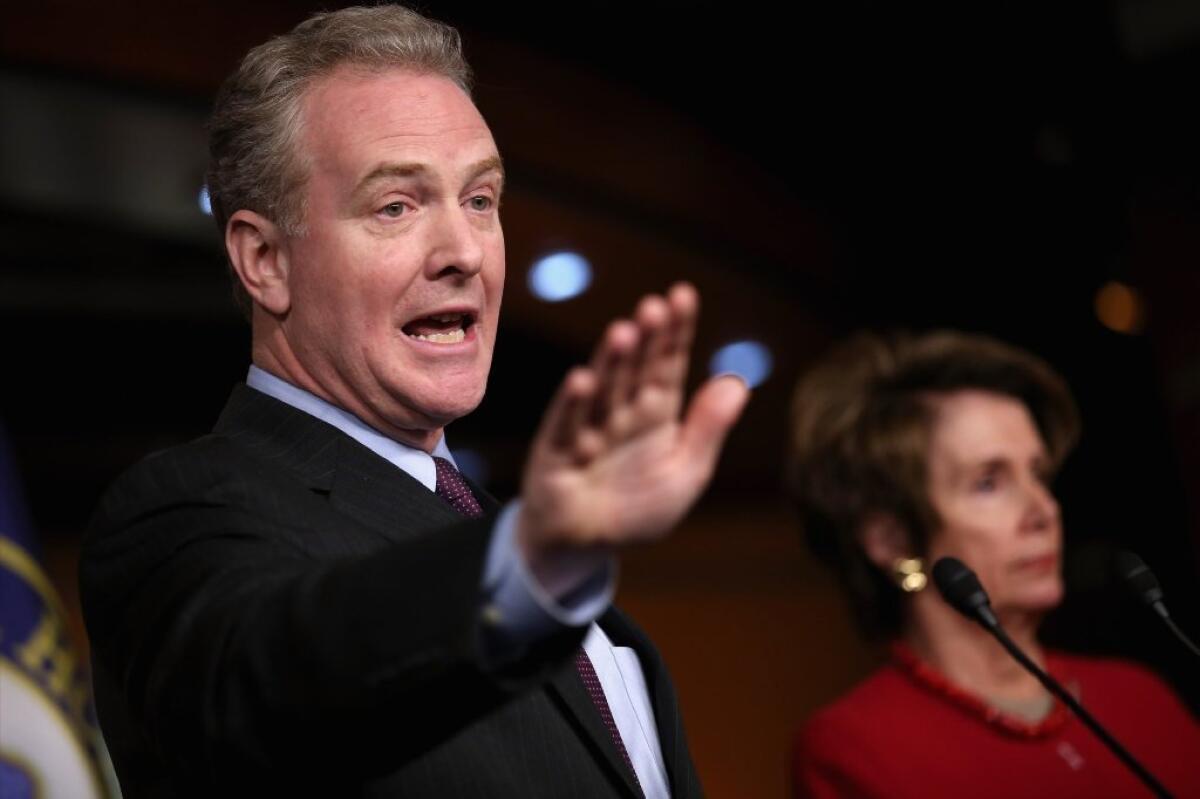The Democrats’ sequester proposals: You can’t be serious

- Share via
Members of Congress left Washington on Friday for their annual Presidents Day state (or district) work period, planning to resume toward the end of the month. The break means Congress can’t do anything about the looming sequester -- roughly $85 billion in across-the-board spending cuts -- until days before it’s scheduled to begin taking effect on March 1.
Predictably, Democrats who oppose the sequester blasted House Speaker John A. Boehner (R-Ohio) for not keeping the chamber in session to work on alternatives. “Once again, Speaker Boehner and the House GOP have decided to walk out on the economic interests of the American people,” declared Rep. Chris Van Hollen of Maryland, the top Democrat on the House Budget Committee. “We need to stay in Washington until we find an agreement that creates jobs while taking a balanced approach to deficit reduction.”
But Democrats haven’t given Republicans any reason to stick around and talk. Instead, their proposals suggest they’re simply positioning themselves to score political points when the sequester goes into effect, rather than seriously trying to avert it.
The argument against the sequester is that it’s too big for the fragile economy to absorb and not targeted enough to avoid damaging high-priority programs. Canceling it is out of the question -- there are plenty of Democrats who agree with Republicans that Congress has to start reining in the deficit. But both sides also agree that there are better ways to go about that task.
Obama has urged Congress to put off the short-term cuts in favor of a long-term deal that puts Washington’s fiscal house in order. That’s the right framework. The problem is that Republicans don’t believe he’s willing to make the sort of structural changes to entitlements that they say are necessary.
Meanwhile, Democrats in Congress call for replacing the first year of the sequester mainly with tax hikes on the party’s favorite targets: the wealthy, energy companies and corporations that ship jobs overseas. The House plan would slash direct payments to farmers in addition to raising taxes; the Senate version would cut defense spending too, although less dramatically and more slowly than the sequester would in 2013.
Conspicuously absent from either of those proposals is even a token cut in domestic discretionary programs or such sacred cows as Medicare and Medicaid. As a result, they’re guaranteed to go nowhere.
It’s as if Democrats have forgotten the budget deal they struck in early January, which cut about $600 billion from projected deficits entirely through higher tax rates on high-income Americans. That agreement left congressional Republicans feeling as if they’ve done all they need to do on taxes for a while. Democrats might persuade Republicans to agree to another increase in revenue as part of a sweeping deal that puts the federal budget on a path to balance. But it’s absurd to think the GOP would accept more tax hikes as an alternative to a minor, one-time reduction in the deficit.
Van Hollen’s no dummy, so he must believe either that Republicans hate the possibility of a sequester much more than they’re letting on, or that the public backlash against the GOP will be enormous if the cuts aren’t avoided.
If Democrats were really serious about finding a replacement for the sequester, they’d join Obama in arguing for a long-term deal and throw their support behind more meaningful savings in entitlements. Then the debate could focus on the right issue -- whether now’s the right time for deep spending cuts -- and not the Democrats’ reluctance to cut spending, period.
The House GOP has been equally unserious about avoiding the sequester, passing bills to replace across-the-board cuts in defense with deeper cuts to non-defense programs. House Armed Services Committee Chairman Howard “Buck” McKeon (R-Santa Clarita) has been charting something closer to a middle-ground path, proposing to replace the first year’s cuts in all federal programs with a 10-year freeze on government hiring and congressional pay increases.
Such a plan would be a poor substitute for a long-term budget deal, but unlike the proposals from party leaders, it’s actually worth considering.
ALSO:
Covered California previews the new marketplace for health insurance
Follow Jon Healey on Twitter @jcahealey
More to Read
A cure for the common opinion
Get thought-provoking perspectives with our weekly newsletter.
You may occasionally receive promotional content from the Los Angeles Times.







